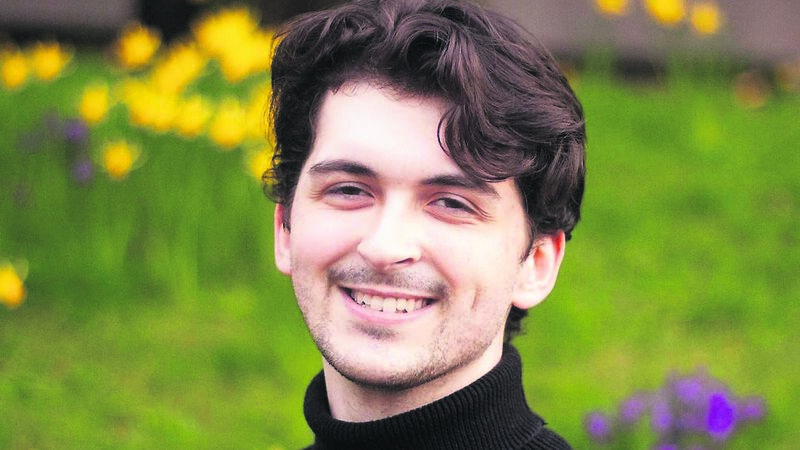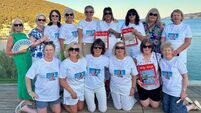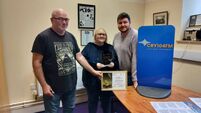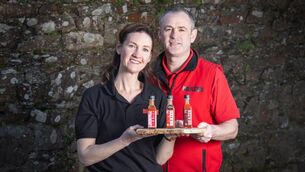What is love? Question at heart of Raymond’s new Summer Soap for The Echo

Raymond Jarvis, The Echo’s Summer Soap author, whose story begins on Monday, in print and online at EchoLive.ie
The subject of love is under the spotlight in The Echo’s annual Summer Soap serial starting next week, written by an American post-graduate student in Cork.
Now in its tenth year, Summer Soap is a daily fictional serial run over 12 episodes, chosen from the submissions of students on UCC’s MA in creative writing programme.
The latest Summer Soap starts its 12-episode run in The Echo and online at EchoLive.ie on Monday.
Its author is Raymond Jarvis who has penned A Symposium Crawl. This native of Providence, Rhode Island, says his fictional story was inspired by the philosopher Plato’s Symposium, and a pub crawl.
Plato’s Symposium, a friendly contest of speeches given by a group of notable Athenian men attending a banquet, explores the concept of love.
Raymond says that the original symposium occurred with several people in a circle in a room talking to each other about love.
“I didn’t want an environment like that. I wanted something more fluid so I could highlight places across Cork,” he explains.
“Instead of it being in one place, I’ve set it in a sort of pub crawl.
“One of the primary characters in the soap is Alexis, who goes into four different pubs to ask people about love. Instead of a circular debate, it’s people talking to Alexis.”
Alexis first listens to the wisdom of an elderly couple, who talk about love as being something that is constantly developing.
The male character, who married twice, believes the older you get, the more you’re able to give love because of the experience you’ve clocked up.
“This is in contrast with the character of Calum who is interviewed at the end. He is a young hotshot who thinks that love is only possible for people under the age of 30 because it’s all about passion and fire. As you get older, you can’t have that,” explains Raymond.
The Summer Soap unfolds in four pubs across the city whose names have been “changed slightly. People can figure out what the actual pubs are,” teases Raymond.
Asked if he frequents Cork’s pubs, he says he probably goes to them “more than I should. I grew up working in restaurants and bars in Providence.”
Raymond, whose undergraduate degree was in political science and classical history at Providence College, wrote an article in The Echo last December outlining the fact that he won’t be going home for at least four years now that Donald Trump is in power in the White House.
“I strongly disagree with a lot of the things the current administration is doing,” he says.
“I’ve been trying to be vocal to maintain awareness of what’s going on there. But I recognise I’m in a privileged position.
“I’m able to remain in Ireland and by the time I finish here, Trump will be out of office. At that point, I would reconsider going back.”
The mid-term elections coming up next year will be a good indication of which way America is turning, says Raymond.
“I would say that, regardless of Trump’s current actions, after this administration, the checks and balances and the branches outside of the executive will be forced to become a lot stronger.
“So, while things are hard now, I think the end result will be that the United States government is going to be better at dealing with people like Trump in the future, so that something like this doesn’t happen again.”
Embarrassed by Trump, Raymond admits that he had “some minor anxiety” after his article was published in The Echo in December.
“As time passed, I sort of dealt with it in my own way. At this point, I think there really is no alternative other than speaking up.
“The mindset of just accepting that this is the way things are and we can’t do anything about it is a harmful mindset. It doesn’t help the problem. I’d like to help the problem.
“It’s why I transitioned towards creative writing, and why I’m planning to go back to political science. I have the capacity to be vocal.”
As Raymond says: “What are they going to do, deport me from my country of residence?”
Ultimately, he would like to work in a university as a teacher. He plans to do a doctorate in political science and is looking at UCC, UCD, and Trinity College Dublin as possible places in which to study. “I like doing work that bridges the gaps between ancient history, modern history and contemporary history,” he says.
For his doctorate, Raymond is interested in looking at how political satire in the revolutionary era, influenced by ancient Greek writers, paved the way for programmes like SNL (Saturday Night Live), critiquing political figures.
Raymond initially wanted to be a lawyer. “But as I started to get into the classics and translating Greek and Roman plays, I enjoyed translating and writing so I signed up for creative writing. Now, I think that political science will be better for the longevity of my career.”
While Raymond considered doing a PhD in creative writing, which would involve finishing the novel he’s working on, his advisor said that he is going to write a book regardless. But given that there are only about 13 professors in creative writing in Ireland, Raymond’s chances of working in academia here would be a lot better if he were to pursue political science.
His novel is about a man who has been cursed by some faeries. “The man doesn’t know his own name and anybody that meets him forgets about it once they fall asleep. It’s set in North America but it is influenced by Irish mythology.”
Raymond’s Summer Soap starts in The Echo and online at EchoLive,ie on Monday.







 App?
App?


